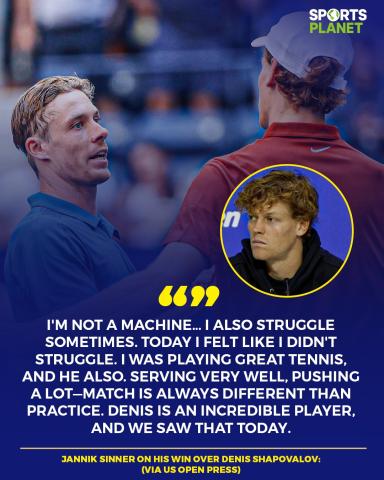
In a post-match interview that was as refreshing as it was insightful, Jannik Sinner stood covered in sweat and offered a dose of stunning humility after a hard-fought battle. "I'm not a machine… today I felt like I didn't struggle, and Denis played great too."
This statement, following a tense, close US Open match against a formidable Denis Shapovalov, reveals more about Sinner's champion mentality than any trophy ever could. In an era of superhuman athletes, Sinner won not by being perfect, but by being real, resilient, and strategically brilliant.
The Master Mindset: Winning the Mental Battle
Sinner’s quote is a masterclass in champion psychology. Let's break it down:
-
"I'm not a machine…": This is a public acknowledgment of his own humanity and pressure. By stating this, he does two things: he manages external expectations and internally gives himself permission to problem-solve through difficulty rather than panic about it. This self-awareness prevents frustration from festering during the match.
-
"...today I felt like I didn't struggle...": This isn't a comment on the scoreline, but on his emotional state. He's saying he never felt overwhelmed or lost, even when the points were going against him. This is the core of mental strength: maintaining clarity and calm amidst chaos.
-
"...and Denis played great too.": This shows immense respect for his opponent and the situation. It acknowledges that a match is a shared experience. This mindset prevents him from underestimating anyone and allows him to focus solely on solving the problem in front of him—a red-lining opponent—rather than being surprised by it.
This combination—self-awareness, emotional control, and respect for the contest—is what separates great players from champions.
Game Analysis: How Strategy Trumped Firepower
On paper, Shapovalov's flashy, high-risk game can blow anyone off the court. Sinner’s victory was a testament to a superior strategy that absorbed and neutralized that power.
Sinner's Winning Strategies:
-
The Immovable Wall of Depth: Shapovalov thrives on short balls he can punish. Sinner’s primary strategy was to hit every single groundstroke with deep, heavy, penetrating depth. This consistently pushed Shapovalov back behind the baseline, robbing him of angles and forcing him to generate his own power, which dramatically increases his error rate.
-
Targeting the Backhand: While Shapovalov has a dazzling one-handed backhand, it is less reliable than his forehand under prolonged pressure. Sinner relentlessly pounded high, heavy balls to Shapovalov's backhand side, preventing him from setting up for his explosive shot-making and drawing a slew of errors.
-
Controlling the Center: Sinner refused to be drawn into a shooting war of angles. He focused on hitting deep, powerful shots right down the middle of the court, shrinking the angles Shapovalov could create and allowing Sinner to cover the court efficiently. This turned the match into a physical battle of attrition, where Sinner’s superior fitness is a major advantage.
-
Capitalizing on Key Moments: The match was close, but the difference was Sinner's performance on the biggest points. When facing break points, he trusted his biggest weapon—a massive first serve—or engaged in a high-percentage cross-court rally. When he earned a look at a second serve on a break point, he stepped in and attacked aggressively. He played the scoreboard with a cold, clinical efficiency.
Expert Advice: Lessons from Sinner's Win
Any player can learn from how Sinner navigated this challenge:
-
Your Mindset is a Strategy: Your emotional state is not separate from your game; it is the foundation of it. Practice staying calm between points. Take a deep breath, look at your strings, and focus on the next point. Don't berate yourself for errors; accept them and move on.
-
Depth Over Power: You don't need to hit winners on every shot. Focus on getting every ball deep near the baseline. This is the single most effective way to neutralize an aggressive opponent and force errors.
-
Have a Pattern: Identify your opponent's weakest shot and have a default pattern to exploit it. For Sinner, it was "heavy ball to the backhand." For you, it might be "serve wide and hit to the open court." Simple, repeatable patterns win matches.
-
Win the "Money" Points: Practice specific scenarios: what will you do at 30-30? On a break point down? On a break point up? Having a plan for these moments eliminates doubt and allows you to play with Sinner-like clarity.
The Final Word
Jannik Sinner’s victory was a testament to the fact that modern tennis is won as much between the ears as it is from the baseline. By embracing his humanity, controlling his emotions, and executing a watertight game plan, he didn't just beat Denis Shapovalov. He passed a critical test of a champion's resolve, proving that even on a day when you're "not a machine," you can still find a way to win.
